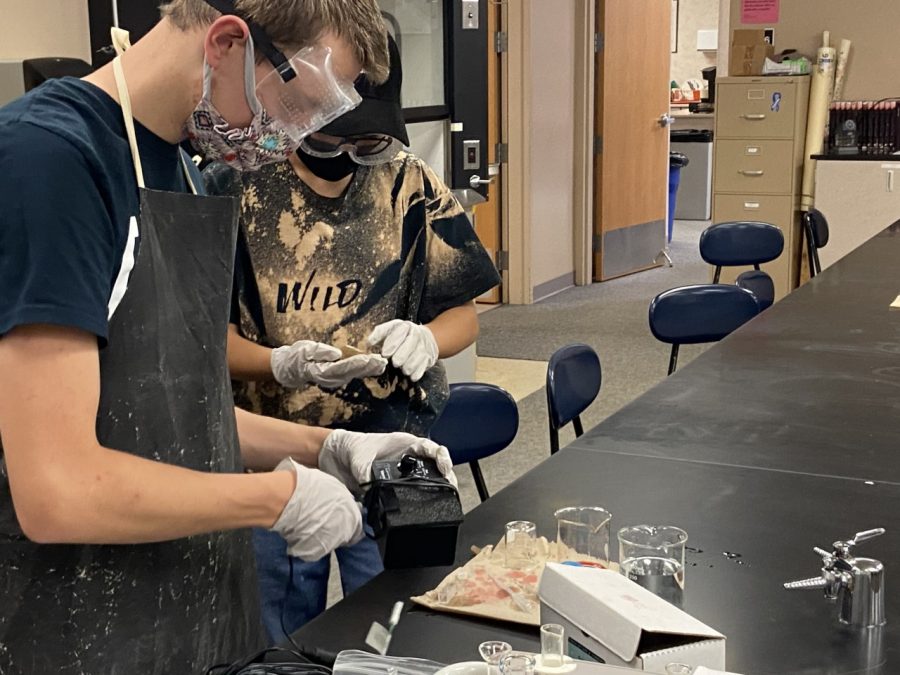The Benefits of Masking: Why We Wear Them
Chemistry students working on lab in masks.
September 16, 2021
There are many different benefits when it comes to wearing a mask, whether you are with a small or large group of people, or if you are vaccinated or not. Some may wonder how exactly these masks work? According to an article from the CDC, COVID-19 spreads through respiratory droplets that you breathe in during person-to-person contact. Respiratory droplets are small particles that are made out of saliva, mucus, and other matter from the respiratory tract.
When you are wearing a mask, it prevents you from spreading these respiratory droplets or receiving them from others. The CDC says, “You should wear a mask, even if you do not feel sick. This is because several studies have found that people with COVID-19 who never develop symptoms (asymptomatic) and those who have not yet shown symptoms (presymptomatic) can still spread the virus to other people.”
You should wear your mask anytime you are using public transportation, such as planes, buses, trains, etc. Some people do not like to wear masks, which is understandable, but it is really important to keep our schools and community safe.
Thoughts On The Mask Mandate
Rosanna Czarnecki, Study Skills teacher at Doherty said, “I understand why students are frustrated if they are vaccinated because they feel like they’ve taken the steps to stay healthy and be responsible, but they are still required to wear masks.” She also feels if we only have the students who haven’t been vaccinated wear masks that we are “shaming them.”
When asked how they felt about the new mask mandate and what could we do to stop the spread of COVID-19 Doherty freshman, Trystyn Henrickson said, “The mask policy doesn’t bother me. I think if maybe we have the kids that are sick not coming into school it would be better.” Henrickson thinks that it’s better to be with people and to be around them instead of being confined by ourselves.
How to Properly Wear a Mask

Wearing a mask can keep you safe, as long as it is worn properly. When you are wearing a mask, you protect yourself and others from getting the virus. The Center for Disease Control (CDC) has maintained that a mask, although not a substitute for social distancing, works better when everyone wears one correctly; covering the nose and mouth, as well as fitting snugly along the sides of the face. The CDC recommends these guidelines for everyone’s safety, so it is our responsibility to try and follow them as best we can.
What Masks Are Most Effective?
Your mask can protect you from the virus on various levels, depending on the fabrics that were used to make it and how it was made. Various types of masks will not work as well at protecting you and others. For more details go to this link.
Get Vaxxed or Wear a Mask
Vaccinations of any kind are important, however, when a vaccination results from a pandemic, it is our responsibility to either get vaccinated or wear a mask to minimize the risk to others. Once you are fully vaccinated you can do things you couldn’t do while in quarantine, such as not wearing a mask and hanging out with friends and family, as it lowers the risk of getting COVID-19 and the effects of the delta variant.
The CDC states, “If you are fully vaccinated, to maximize protection from the delta variant and prevent possibly spreading it to others, wear a mask indoors if you are in an area of substantial or high transmission.” An area with high transmission is a public or unclean place where COVID-19 can be easily spread, for example, schools, airports, public gatherings, and the like.
When thinking about getting the vaccine, think about the pros and cons to make sure you want to get it. If you don’t feel that you have enough information visit here and read all the information you can to make a more educated decision.
All About the Delta Variant
What exactly is the Delta variant and why is it so serious? The Delta variant is a mutation of COVID-19 that spreads over two times faster than the original virus strain. This variant attacks a younger audience and people who aren’t vaccinated such as children and adults under 50 while the original strain typically infected people 50 and up.
In studies from Canada and Scotland, it showed patients infected with the Delta variant were more likely to be hospitalized than patients infected with the alpha (or the original virus that causes COVID-19). Even so, the vast majority of hospitalizations and deaths caused by COVID-19 are in unvaccinated people.
Unvaccinated people remain the greatest concern: The greatest risk of transmission is among unvaccinated people who are much more likely to get infected, and therefore transmit the virus.” The CDC recommends masks to lower the chances of getting COVID-19 or the Delta variant.
Although inconvenient at times and uncomfortable to some, the mask has proven to be a valuable tool for protection, prevention, and peace of mind. We always encourage everyone to stay safe when going into public areas and to follow the guidelines that have been set forth by the district.






Patty Burney • Sep 21, 2021 at 7:39 pm
Most excellent article. I am a strong proponent of mass vaccinations. We aren’t going to beat this thing as long as approximately 30% of the population refuses to vaccinate. This give the virus a hotbed of opportunity to mutate into something much worse. It is a moral imperative of all members of society to take the best possible precautions to avoid this and stop this ongoing problem with mutation and breakthrough. There is a saying that your right to swing your fist ends at the tip of another’s nose. Your right to personal freedoms actually stops when your decisions put the rest of the world at risk of severe illness and death. Freedom is dependent on this personal responsibility. You must care enough for your own society to make good decisions, not just for yourself but how it affects the rest of your community. The faster we get everybody vaccinated the faster we can return to some semblance of normal. Mask and vaccinate. This makes you a hero in the eyes of the world.❤️❤️❤️